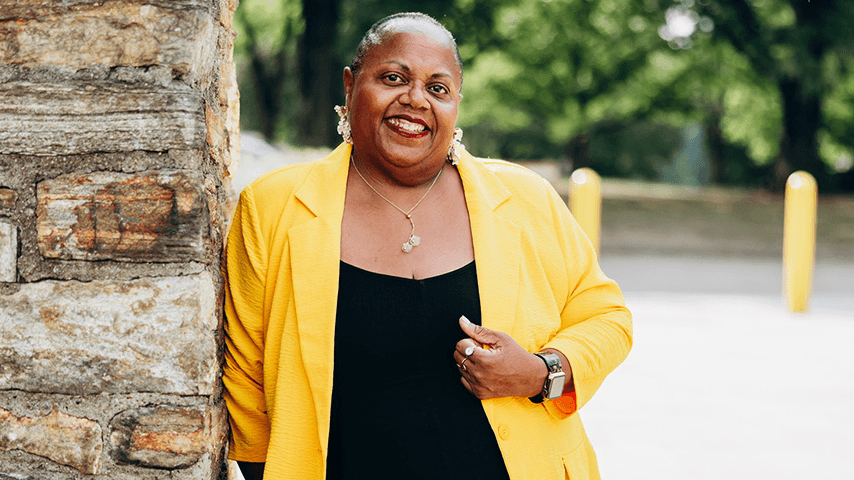Treating Obesity With Compassionate Care: Michele Tedder's Personal Journey
7 min read

Related Topics
Adequate care for obesity requires a comprehensive plan that includes access to healthy foods and medication. That plan should also encompass lifestyle changes and behavioral approaches centered on healthy eating habits and physical activity. This is according to Michele Tedder, someone who knows firsthand what it's like to not be listened to. She’s especially adamant about promoting unbiased, person-centered care for people living with obesity.
“It is my belief and passion that we all have a responsibility to eliminate weight bias,” Tedder said.
What is the meaning of weight bias?
Weight bias consists of negative beliefs, attitudes, and stereotypes held toward people living with obesity. Perceptions that obesity is caused by personal choice (e.g., laziness, lack of self-control, or non-compliance) versus non-controllable disease factors (e.g., a thyroid condition) tend to perpetuate and increase weight bias and stigma.
Unfortunately, many health care professionals receive limited education and training on effective evidence-based approaches to obesity management and how to provide patient-centered, non-judgmental care. Tedder, a registered nurse (RN) herself, admits that “most of us—when we’re in our training programs—have not received adequate training around how to interact with people living with the disease of obesity.”
What are examples of weight bias in health care?
Studies of self-reported attitudes among nurses revealed the following:
- 31% would prefer not to care for people with obesity.
- 24% agreed that people affected by obesity repulsed them.
- 12% would prefer not to touch peopleaffected by obesity.
Even physicians are a common source of stigma. In a study that surveyed more than 2,400 adult women about their experiences of weight bias, 69% of respondents reported that doctors were a source of weight bias, and 52% said they have been stigmatized by a doctor on multiple occasions.1
What are the effects of weight bias?
Weight bias is linked with the following negative consequences:
- Suboptimal care is what people receive due to reduced time spent in appointments; poor patient-provider communication; and fewer preventive screenings.
- Workplace discrimination—in which employees affected by obesity are viewed as incompetent and undisciplined—negatively impacts wages, promotions, and decisions about employment status. Women affected by obesity earn 12% less than female peers who are not affected by obesity. They are also more likely to be in low-paying jobs than women not living with obesity. On the other hand, men affected by obesity are underrepresented and paid less than male peers who are not affected by obesity in managerial and professional positions.1
- Social exclusion, lowered self-esteem, and poor quality of life are aggravated by weight bias. Many people living with obesity report feeling isolated, misunderstood, and invisible. The consequences of being denied jobs, rejected by peers, and treated inappropriately by health care professionals inflict mental and emotional suffering on people affected by obesity.
Fighting weight bias with compassionate care
Tedder spent a lifetime dieting with limited success. “I’ve been overweight since childhood. I can’t tell you how many times I’ve showed up in a doctor’s office and they’ve told me…that I need to lose weight. The crazy thing about having that kind of experience is that health professionals had very little to tell me about how to lose weight other than eat less and exercise more, which I had been doing over and over again with minimal results.”
Because obesity was not recognized as a disease in her youth and conventional advice on losing weight was ineffective, Tedder developed hypertension, type 2 diabetes, high blood cholesterol, sleep apnea, and joint pain due to osteoarthritis by the time she reached adulthood.
Her journey with obesity took a positive turn when she met a primary care provider (PCP) who listened to her, validated her story, and was willing to work with her for years.
I kissed a lot of health care frogs prior to finding a PCP who was finally able to help me develop a specific plan of care that ultimately led to better health, accessible obesity care, and comprehensive services from health systems.”
In other words, she received compassionate care.
What is the meaning of compassionate care?
Compassionate care is the practice of providing empathetic, patient-centered health care that prioritizes dignity, respect, and emotional support. It goes beyond medical treatment by focusing on actively listening to the patient, understanding their needs, and responding with kindness.
How can health care professionals provide compassionate care?
There are five components to providing compassionate care, which Tedder describes as:
- Trust. This is the foundation to healthy communication within health care settings, along with respect. “You know, it’s very frustrating when you walk into a care provider’s office and you’re telling them what your lived experience is, and they’re either looking at you in a way that invalidates what you’re saying or they’re inappropriate in how they speak to you about their perception of how you present in that office,” Tedder said. She urges clinicians to use a “people-first” approach to language when addressing patients and referring to them in their documentation. “A person is not their obesity. A person lives with a chronic disease like obesity. Approach patients with curiosity, not judgment.”
- Health-seeking behaviors. Understand that among people living with obesity, these behaviors are going to vary depending on their experience with the health care system.
- Timely diagnosis and intervention. Commitment to diagnosing the issues and collaboratively developing appropriate interventions is key. “Most people with obesity have been trying things for many, many years," Tedder said. "If someone tells you that they’ve tried every diet known to man, believe them because they probably have. Affirm people.”
- Patient-centered approaches. “People are unique, and so treatment must also be. There’s no one-size-fits-all approach.” Health care professionals have a responsibility to meet people where they are.
- Collaborative decision-making. When working to come up with solutions together with someone living with obesity, it’s important for health care providers to consider that options may be limited, depending on their geographic area and the scope of their health care coverage. It’s also vital that they are the author of their story. “People don’t want to be told what to do," Tedder said, "but they want a collaborative partner to help them come up with person-centered options to treat their disease.”
The Obesity Bill of Rights provides a framework for clinicians to deliver compassionate care and to affirm patients’ rights to accurate, clear, trusted, and accessible information.
“I can tell you from personal experience that was not always what I received,” Tedder said. “Older adults with obesity deserve quality obesity care, and people have a right to the full spectrum of treatment options because one size does not fit all.”
How does compassionate care affect patient outcomes?
Compassionate care can strengthen the overall health care experience. It improves patient outcomes by fostering trust and emotional well-being and making patients more likely to stick with their treatment plan.
For Tedder, the results of receiving compassionate care were profound: after undergoing weight loss obesity surgery in 2017, her type 2 diabetes went into remission. She no longer needs cholesterol medication and of the two blood pressure medications she used to take, one was discontinued and the dosage of the other was reduced to half. Tedder's joint pain and sleep apnea greatly improved.
“I can happily say that I’m living my best life, and it’s the result of having a provider who was able to implement compassionate care.”
About Michele Tedder: A champion for comprehensive obesity care
Michele Tedder, MSN, RN, is a Senior Program Manager at the Black Women’s Health Imperative (BWHI). She led the creation of BWHI’s family-centered Diabetes Self-Management Support Program curriculum and oversees the program currently delivered in collaboration with multiple partner sites.
Having struggled with her weight since childhood, Tedder knows what it is like to experience the negative impacts of living with a chronic disease like obesity. Through her lived experience she uses her influence to advocate for comprehensive obesity care. She is a sought-after speaker, panelist and subject matter expert discussing issues and policies that impact access to obesity care.
Tedder was recently a recipient of the 2023 HealtheVoices Impact Award sponsored by Johnson and Johnson, given to health advocates to support the advancement of their work. She recently joined the national board of directors of the Obesity Action Coalition, a national non-profit dedicated to raising awareness and improving access to the prevention and treatment of obesity.
She is also the founder of Village Empowerment Solutions, a consulting business focused on supporting organizations in the development of strategies that improve health outcomes for people living with chronic diseases. And she recently launched a podcast called Dear Healthcare Provider. Tedder holds a bachelor’s degree in nursing from the University of Pittsburgh and a master’s in nursing education from Indiana University of Pennsylvania.
Sources
1. Obesity Action Coalition. Understanding Obesity Stigma Brochure. Found on the internet at https://www.obesityaction.org/get-educated/public-resources/brochures-guides/understanding-obesity-stigma-brochure/




